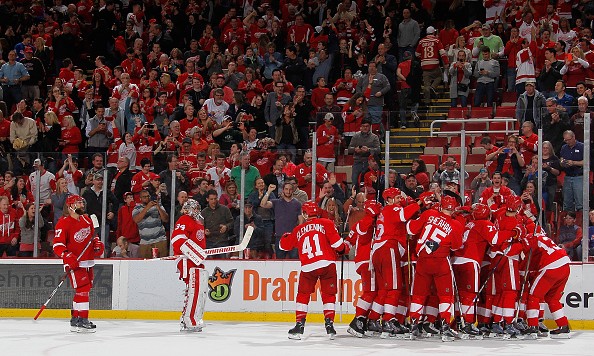There are a lot of ways to illustrate how impressive the Detroit Red Wings playoff streak is, but I believe one fact stands above the rest. Jaromir Jagr was not in the NHL the last time they missed the playoffs.
That miss – in 1990 – was one of two times the Red Wings haven’t played beyond the regular season in the past 31 years. Detroit has qualified for the playoffs for 24 consecutive seasons. In that time, the Wings have made it as far as the Conference Finals 10 times and the Stanley Cup Final six times, walking away with four titles.
But the streak may not extend to a quarter-century. Detroit’s playoff chances are in serious doubt after a late-season swoon.
The first year of the Jeff Blashill era got off to a rocky start. The Wings went 8-8-1 through mid-November and rocked below-average possession numbers. The team improved to 29-18-9 by Valentine’s Day, but things began to unravel from there. They’ve gone 7-8-2 since and currently sit behind Philadelphia for the final playoff spot (they both have 83 points, but Philly has a game in hand). Things aren’t hopeless, but they’re beginning to look bleak.
And this is in the midst of a more-than-solid season by goalie Petr Mrazek. The young Czech netminder has a .923 save percentage, helping Detroit to ninth in the league at even strength in that department.
But, breaking with tradition, Detroit’s offense has not been particularly potent this season. The Wings are 22nd in the league with 186 goals.
There are a few reasons for this.
For starters, the Red Wings play a fairly-conservative style. They’re 28th in the league in 5-on-5 corsi events per 60 (basically shots at the net for either team). Essentially, they take and allow a relatively small amount of shots. Additionally, the Wings have had little success on the power play this season, scoring on just 17.6 percent of opportunities (20th in the league). On the flip side, the penalty kill has been mediocre, stopping 81.1 percent of opposing opportunities. Special teams have hurt the Wings this year.
Luck may also be a factor in Detroit’s inability to score. The Wings are 23rd in the league in even-strength shooting percentage at 7.1 percent. Gustav Nyquist (10.8%), Pavel Datsyuk (9.6%), Henrik Zetterberg (7%) and Brad Richards (6.2%) are all below their established shooting capabilities.
There’s also the possibility the franchise is finally trending downward after an incredible run of success. They’ve certainly been less dominant in the past five seasons. Between 1992 and 2011, the Red Wings won 32 playoff series and captured 14 division titles.
But they’ve won just one series – an upset over Anaheim after the lockout season – in the time since. The 2012 and 2014 seasons featured four-to-one beatdowns at the hands of Nashville and Boston, respectively, where Detroit looked like an overmatched shell of the past. Datsyuk and Zetterberg aren’t what they once were and it shows. It only seems natural that the Wings would have to eventually have to fall out of the playoff picture and start over.
The reason this is so hard to believe is the franchise has done such an incredible job of keeping young talent stocked despite basically never picking high in the draft. Dylan Larkin, third in team scoring, is 19. Tomas Tatar, fourth, is 25. Nyquist, sixth, is 26. Riley Sheahan, Tomas Jurco and Andreas Athanasiou have all shown potential.
There’s no doubt the team is loaded with young, capable players. The question for the long term is whether any of these guys will develop into the Zetterberg/Datsyuk caliber of player that can carry a team through the playoffs. Right now, aside from Larkin, the roster seems to be loaded with nice complementary pieces.
In the short term, there really is no major or pressing issue for the Wings. The team is good, but flawed. The type of team that teeters on either edge of the playoff bubble. They’re more than capable of getting into the playoffs this year, but they’re not likely to scare any of the top contenders.
These are not your slightly older cousin’s Red Wings. They don’t control the puck like the old Soviet Olympic teams. They don’t score in bunches. There’s no future Hall of Famer patrolling the blue line.
And, unlike the past two and a half decades, there’s no guarantee they even make it.

